|
|
|
 |
|
"GUIDED BY THE SPIRIT,
SIMEON CAME INTO THE TEMPLE
AND WHEN THE PARENTS BROUGHT IN THE CHILD JESUS,
TO DO FOR HIM WHAT WAS CUSTOMARY UNDER THE LAW,
SIMEON TOOK HIM IN HIS ARMS AND PRAISED GOD”
LUKE 2:27
|
|
|
 |
|
 |
|
|
Just a short while ago, the world was
celebrating the birth of Jesus over two
thousand years ago in the Judean town of
Bethlehem. In Luke’s birth narrative,
we read to our surprise that shepherds were
the first to know that the messiah was born
in David’s hometown. In those days,
shepherds were considered the lowest of the
low in Judean society. They were
thought to be so untrustworthy that their
testimony was not accepted in any Judean
court. |
|
|
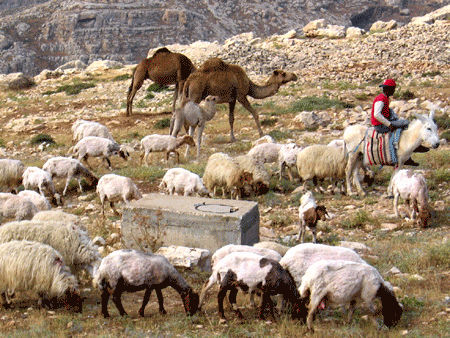 |
|
Photo:
Gila Yudkin |
|
Shepherds' fields by
Bethlehem |
|
|
On the eighth day, Jesus was
circumcised and named, as is the Jewish
custom to this very day. In modern
Israel, until the ceremony of the brit
(literally, covenant), the baby is called
baby/name of mother, for example babyMary or
babyGila. When it comes time in the
ceremony to name the baby publicly, there is
a hush so that you could hear even a little
pin drop, as everyone listens for the
announcement of the infant’s name.
This is reflected in the story of the naming
of John the Baptist at his brit ceremony,
recorded in Luke chapter 1.
According to Leviticus 12, a woman who gave
birth to a male child was unclean for seven
days. On the eighth day, the child was
circumcised. Then the mother was confined
for another 33 days until the days of her
purification were completed. These
forty days were to allow bonding between the
mother and the child. Only after her
purification could she touch anything sacred
or enter the Temple precincts. |
|
|
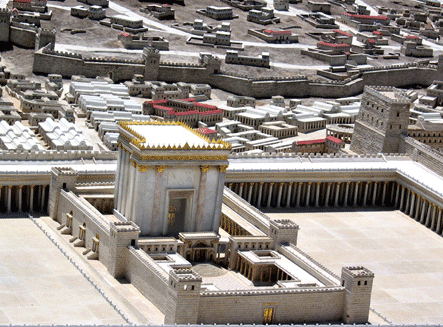 |
|
Photo:
Gila Yudkin |
|
Model of the Second Temple
where Mary and Joseph would have brought
Jesus |
|
|
After her confinement she was to bring a
sacrifice to the Temple of a one-year-old
lamb for a burnt offering, and a young
pigeon or turtle-dove for a sin offering.
If she could not afford a lamb she brought
two turtle-doves or two young pigeons.
Presumably these birds were offered because
Mary and Joseph could not afford a lamb.
This passage pigeonholes Joseph and Mary in
a specific socio-economic category – a low
one -- in their society. |
|
|
COMING TO
JERUSALEM?
BOOK GILA for your customized private tour |
|
|
During the presentation of Jesus in the
temple, the parents meet Simeon and Anna,
who introduce the theme of prophecy.
Anna is Greek, derived from Hannah. (It’s
pronounced Hana in Hebrew with a guttural
h.) Hannah was the mother of the
Prophet Samuel. In the Mishnah (the
commentary of the rabbis), Hannah is
considered one of Israel’s seven
prophetesses. |
|
|
 |
|
Photo:
Gila Yudkin |
|
2,000-year-old street with
the original curbstones outside the Temple
courtyard |
|
|
While walking through the Ophel excavations
by the southwest corner of the Temple Mount,
as I was preparing my popular guide for
individual travelers, “Explore Jerusalem’s
Soul,” I discovered the best place to teach
this story. It’s in a little sitting
area, right opposite Robinson’s Arch. |
|
|
 |
|
Photo:
Gila Yudkin |
|
Edward Robinson noticed an
arch jutting out of the western wall in 1838 |
|
|
Edward Robinson was a Connecticut Yankee who
came to the Holy Land in 1838, aiming for a
greater understanding of the Bible. In
turn, he provided us with a deeper biblical
understanding, for he identified nearly 200
sites mentioned in the Bible, previously
unknown. |
|
|
 |
|
Illustration in the
Land and the Book by W. M. Thomson, published
1869 |
|
"Robinson's Arch" was a very
visible landmark in the 1860s |
| |
|
From where we sit, we’ll look across to
Robinson’s Arch in the outer western wall of
the Temple and stretching our necks
backwards, try to imagine the splendor of
the courtyard Joseph and Mary experienced as
they presented Jesus in its precincts.
An eye-witness, first century Jerusalem
resident Josephus Flavius, describes the
Royal Stoa, on the other side of Robinson’s
Arch like this: |
|
“The Royal Stoa…was a structure more
noteworthy than any under the sun. For
while the depth of the ravine was great,
and no one who bent over to look into it
from above could bear to look down to the
bottom, the height of the portico standing
over it was so very great that if anyone
looked down from its rooftop, combining
the two elevations, he would become giddy
and his vision would be unable to fathom
the end of so measureless a depth.”
(Antiquities V, 11, v)
|
|
Josephus adds that the Royal Stoa had 162
columns. Each was so thick that it
took three men, holding hands, to wrap their
arms around it. The height of each
polished column was 27 feet and it was
crowned with a Corinthian capital. The
beauty of the place was astonishing,
Josephus tells us. |
| |
|
 |
|
Photo:
Gila Yudkin |
|
Herod's Royal Stoa once
stood where the Al Aqsa Mosque stands today |
| |
We will contrast Herod’s opulence to the
simplicity of the circumstances of Jesus’
birth and childhood. We’ll continue
with the story of the frantic parents’ 3-day
search for Jesus, only to discover him
amazing the rabbis with the depth of his
questions in the Temple courtyard.
Then we’ll walk to inspect the excavations
under Robinson’s Arch which revealed the
first century A.D. sidewalk including its
curbstones and a stone specifically chiseled
to allow for drainage. (Winter rain in
Jerusalem can come down in pellets and
apparently this was true 2,000 years ago as
well.) On the western side of the
sidewalk, archeologists discovered doorways
of shops situated on prime real estate
property. I always wonder what they
sold. Could it have been olive wood
camels or picture postcards of the Temple?
On your next trip to Jerusalem, come with me
to Robinson’s Arch, a great place to study
the events of Jesus’ “hidden years” between
his birth and public ministry, as recorded
by Luke. |
|
|
Copyright 2007, 2009 Gila Yudkin. Permission
needed for any reuse. |
|
|
Gila Yudkin,
who calls herself a Connecticut-born Yankee
living now in King David's court, has been
shepherding pilgrims in the Holy Land for
over a quarter of a century. She
hasn’t yet lost one stray – at least not
permanently! She has been guiding
under Robinson's Arch, even while
excavations were ongoing. Gila
delights in sharing the latest discoveries
with both first-time and veteran pilgrims to
Jerusalem. |
|
If you are coming to Jerusalem by yourself
and plan to visit the Temple Mount,
Gila's MP3
Temple Mount audio tour
will expose you its many facets:
Jewish, Christian, Muslim plus archeological,
historical and legendary. Tour the Temple
Mount in the company of Abraham and Isaac,
David and Solomon, Jesus and the disciples, Mohammed and the
archangel Gabriel.
|
|
 |
|
Photo:
Gila Yudkin |
|
Walk with kings, prophets
& patriarchs with itsGila
Temple Mount audio tour |
| |
|
The 2,000-year-old sidewalk, pinnacle stone
and doorways of shops were excavated during
the 28 years dynamo builder
Teddy Kollek was
mayor of Jerusalem. Teddy died on January 2,
2007 at
the age of 95 and a half. Read about this
awesome Holy Land Headliner. |
| |
|
More
Biblical Archeology: |
| |
|
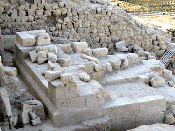 |
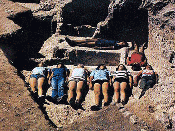 |
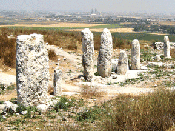 |
|
Herodion / Herod's Tomb |
Priestly Blessing |
Gezer / Solomon's dowry |
| |
|
|
|
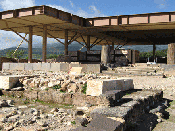 |
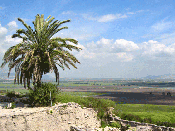 |
 |
|
Hazor / Joshua's
conquest |
Megiddo / Armageddon |
Hippos / Decapolis
city |
|
|
|
If you are planning to come solo (or duo) to
Jerusalem soon, then you may want to
check out Gila’s “Explore
Jerusalem’s Soul” for the Top Ten
places to meditate on the Bible, the Top Ten
little-known churches worth visiting, the
Top Ten most rewarding Roof-Top views and
the Top Ten places for sampling Middle Eastern soul
food. Pick and choose among 40 sites
according to your temperament, time frame,
impulse and imagination, to make every
minute matter during your Jerusalem visit. |
|
|
|
GILA
YUDKIN
•
TCHERNIKOVSKI
64A
•
JERUSALEM
•
ISRAEL
gila@itsgila.com
HOME
•
HOLY
LAND
HEROINES •
TIPS
FOR TOURS •
ABOUT GILA
|
|

